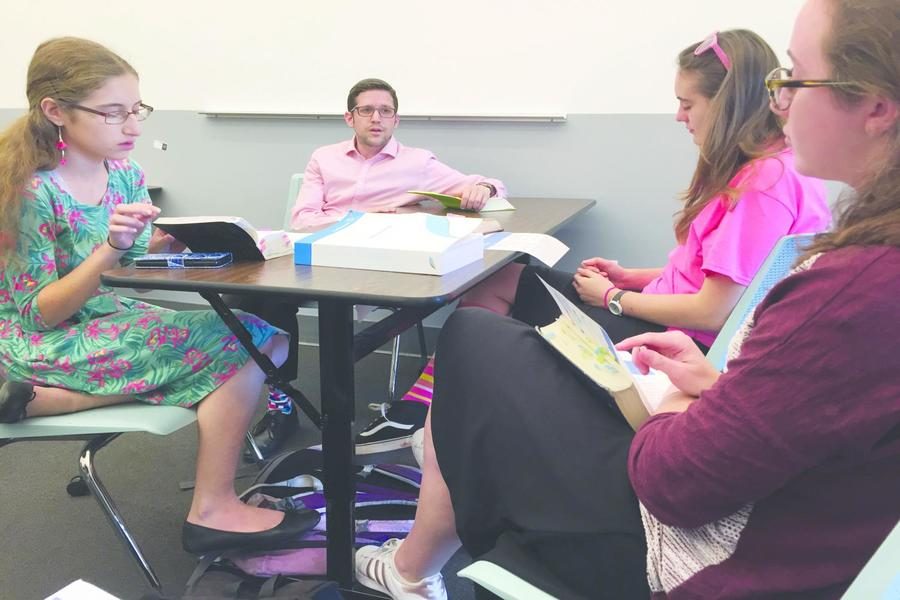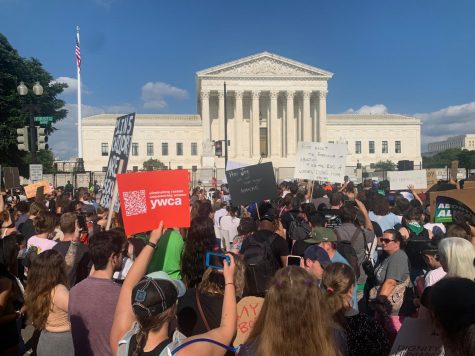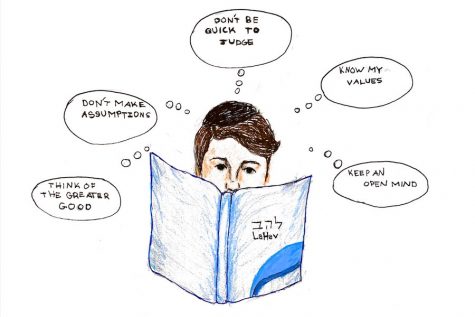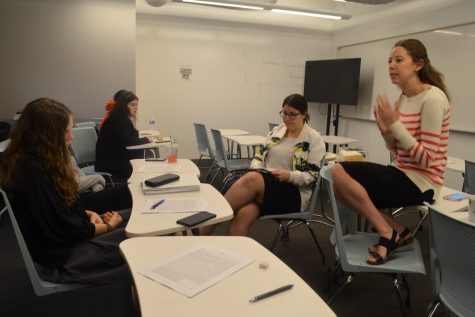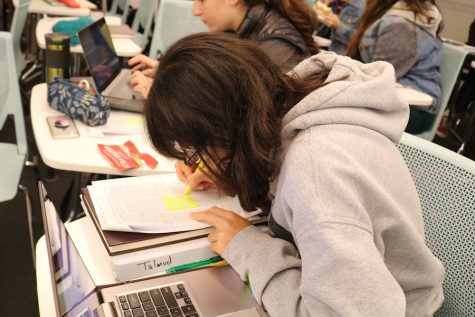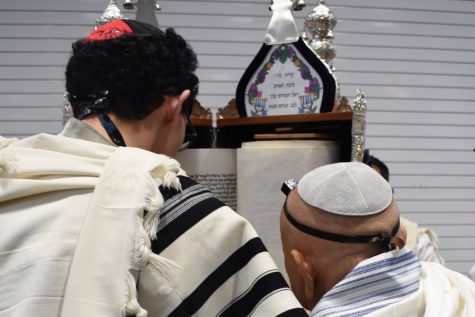Optional extra Judaic classes extend day in both directions
LEARN: Beit Midrash Chabura, led by Rabbi David Block, meets Tuesdays and Thursdays.
Students are opting for extra Torah study this year with three new programs outside of school hours this year: early morning learning with Rabbi Lieberman, a Sunday morning parent- child learning program led by a different Judaic faculty member each week, and small Tanakh and Talmud classes after school.
None of the learning is graded, and some of the programs were suggested by students themselves.
About six students usually come to early morning learning in the Beit Midrash, according to Rabbi Lieberman, while about nine participate in the Talmud Beit Midrash Chabura, or BMC, which takes place on Tuesdays and Thursdays in the Beit Midrash, and in the Tanakh BMC held there on Wednesdays.
The parent-child learning program, called“DBL” — for Davening, Breakfast and Learning — will meet 12 Sundays throughout the school year, specifically before each holiday and the weeks of Shabbat Rosh Chodesh.
“Our approach for the Gemara is just learning,” said Judaic Studies teacher Rabbi David Block, who runs the BMC and DBL programs. “It’s really nice to be in a low-stakes environment where you don’t get graded.”
The Tanakh program is focused on “creating consistency and breadth in Tanakh, as opposed to depth,” he said. Talmud is learning Masechet Beitza, and studying it in the traditional manner — meaning going page-by-page in the Gemara, whereas in Shalhevet’s normal Lahav curriculum, students learn specific pages that are pertinent to the topic students are studying.
Tanakh and Talmud BMC were both responses to student requests. Junior Sharon Khalil had the idea for the Tanakh program and approached Dr. Weissman and Rabbi Block, while senior Tali Schlacht had the idea for the Talmud program.
“I’ve always loved Tanakh and I wanted more than just three hours a week,” said Sharon. Tali already takes Advanced Gemara Shiur three times a week during breakfast, but wanted more.
“Six hours including AGS was not enough,” said Tali. “Now I have eight hours of Gemara and I love it.”
Some co-curriculars have been pushed to later starting times so that students can attend the BMC program. Athletic Director and basketball coach Ryan Coleman no longer has afterschool basketball practice on TuesdaysandThursdays.Choirhawks director Mrs. Joelle Keene now starts choir practice at 5:15 p.m. instead of 4:45, and the practices end at 7 p.m. instead of 6:30.
Others are just allowing BMC participants to arrive late. Junior Talia Gill, in Talmud BMC, is always an hour late to Model Congress.
Earlier in the day, Rabbi Lieberman leads a learning session of Mishna, specifically Seder Moed, which is just finishing the first chapter of Masechet Shabbat. He says that people have shown up every day, despite the other commitments they have in addition to their schoolwork and need to sleep.
“So far, there hasn’t been a day that no one showed,” said Rabbi Lieberman. “It’s hard, it’s early in the morning, and [people have] so many co-curriculars and this and that. But it’s been pretty good.
“I have been doing this for four decades,” said Rabbi Lieberman, who had been principal of YULA Girls High School for 10 years before coming to Shalhevet. “Wherever I taught, I always offered early morning classes, and people showed up. And of course we go off topic many times. It’s a great way to start the day.”
Whenever he gets tired and cannot focus on learning, he said, he closes his eyes for a minute and tells himself that when he opens them he has to be focused.
“It usually works for about seven minutes, and then I have to do it again,” he said.
The DBL program has met three times so far, and will meet nine more times throughout the school year. The first shiur was led by Rabbi Block and the second was led by Ms. Atara Segal.
Scholar-in-residence Rav Judah Mischel led the shiur on Oct. 22. The fact that none of the learning is graded is significant to Principal Dr. Noam Weissman, and follows a pattern of increased enrollment in yeshivas and seminaries Shalhevet has seen among recent graduates.
Most recently, 38 out of 55 of last year’s graduating class — 69 percent — are spending their gap years in Israel in such programs, where students study Torah l’shma — for its own sake — usually receiving no college credit.
“Students at Shalhevet love Torah, it’s as simple as that,” said principal Dr. Noam Weissman. “There’s been a culture that’s been created that’s been about Torah learning, that’s been about Torah l’shma, and students at Shalhevet want more.”
Sharon Khalil says that they’re thinking about changing the name of the Gemara BMC.
“Maybe Night Seder,” she said — which is what evening Gemara shiur is called in yeshivot and seminaries in Israel.
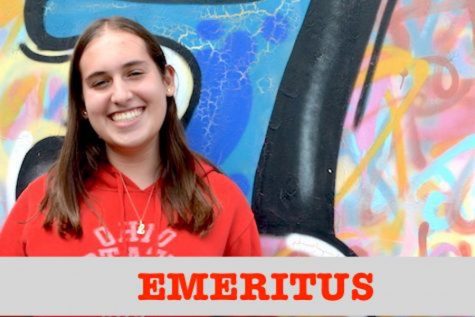
Clara Sandler was co-editor-in-chief during the 2018-19 school year and then studied at the Midreshet Lindenbaum seminary in Jerusalem. She is now a junior at the University of Chicago.

